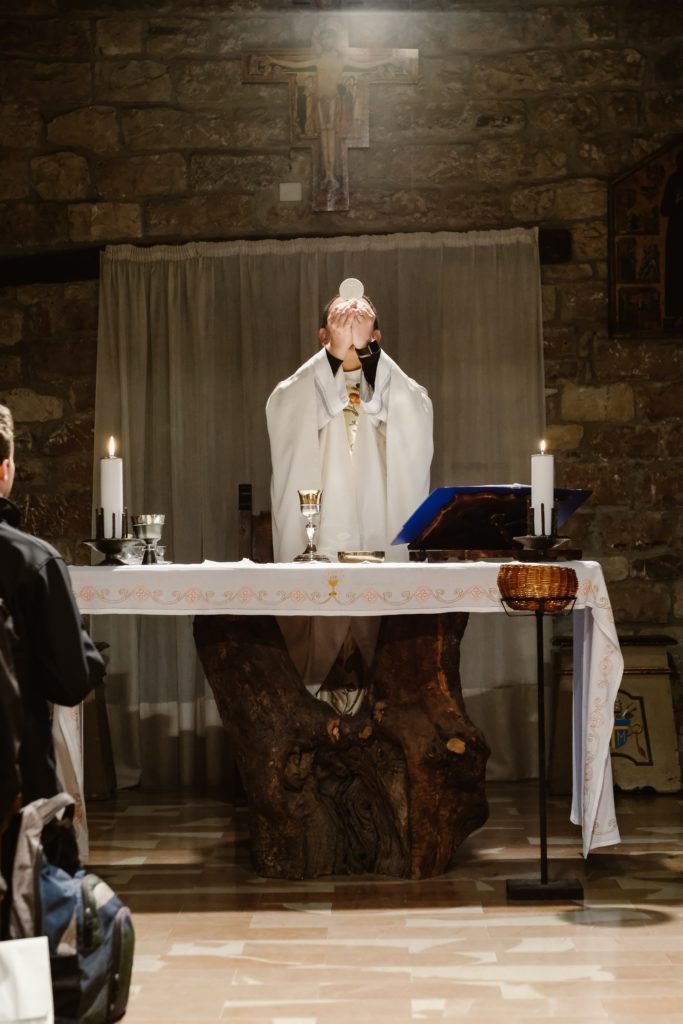“Back to Wonder” is an “immersive experience” from magician and storyteller Helder Guimarães. Limited to 15 people per performance, the show runs through June 18 in South Pasadena and purports to allow the viewer “a peek into his process and the world in which he lives.”
“Can You Keep a Secret?” runs the tagline.
You’re not given the address of the location — I hope this isn’t giving too much away — from which you’re ferried in a vehicle with frosted windows to an undisclosed location with blacked-out windows.
Supposedly we’re in the magician’s studio, but everything seems way too ordered and neat for a studio. Everything exudes the air of having a trick door, or floor, or mirror.
For almost an hour-and-a-half, we witness messages that couldn’t have been sent, predictions that could not have been made, and sleight-of-hand feats that could not have been executed.
“Mind-Blowing!” the critics gush. “Wonderful!” “Amazing!” “Incredibly Beautiful!” “Astonishing Magic!” “Brilliant Performer!” “Masterful!” “Gripping!” “Genuinely Astonishing!”
I try to keep my eyes on his hands, which seem to be in sight at all times. Aha, he partly rolled up his sleeve! Wait, his palm was concealed for a second on an inner thigh! Is it possible for a human being to memorize the order of an entire deck of cards at a glance?
Are there assistants, I wonder, emerging from the walls, beneath the floor, closets, after we moved from one room to another? Were all 14 other audience members plants? No, that wouldn’t make sense, even at $110 a pop, he wouldn’t make any money.
As for the storytelling, Guimarães hits all the right notes: earnest, heartfelt. He speaks of his mother, his father, getting to meet his childhood idol. He hints at the hours, months, years of work, of the desire for perfection.
But I’m not especially wowed by his stories. I find it astounding that he can talk at all while performing his truly impossible stunts.
You receive a personalized note after the show: “My wish is that you do your best to keep all of the secrets of our experience intact for future audiences, but please share its existence with people close to you who you think might enjoy it.”
Understandable. But what secrets? He hadn’t shared any of his own: not how he did his tricks, obviously, and nothing about the state of his heart or soul that he hadn’t told or wouldn’t tell any paying audience.
Then you’re offered some merch.
I once read a piece by the late magician Ricky Jay, a great story with a long buildup about going to a restaurant with a friend. He held the menu before him, then lifted it to reveal a block of melting ice. The way he told the story, the trick was an act of love that had taken years to perfect, stemming from a deep desire to impart to his friend a sense of mystery, delight, and wonder.
That same desire clearly drives Guimarães, before whose mastery I bow. It’s fascinating to contemplate the psychic makeup of the person for whom magic is a vocation. It’s impossible to imagine the painstaking, impossibly long effort required to conceive of and to hone his act.
During COVID-19, Guimarães managed to present via Zoom, as part of LA’s Geffen Playhouse “Stayhouse” series, a rave hit called “The Present” that was sold out for each of its more than 250 shows.
At the same time, I can’t say the performance I saw imparted a sense of wonder. I felt admiration. I felt curiosity. I felt gratitude, profound respect, for his devotion to his craft.
And I ruminated after the show on the definition of a secret. Is a secret, say, a password, that no one else knows? Is a secret a detail about, say, your daily routine that you’d readily share if someone asked, but no one asks because no one much cares?
Is a secret a desire of your heart that you’d feel shy about sharing because it reveals something about the most precious part of you? Is a secret something that weighs on your soul? That’s the kind of secret that many of us are used to telling in confession.
It may be, in fact, that Catholicism ruins a person to feel wonder at a magic trick, no matter how masterfully executed, how startling, how stupendous. Because a trick doesn’t resonate. A trick doesn’t vibrate. A trick implies a level of withholding, because to divulge how the trick works would be to ruin it. So a magic trick is a closed circuit. As an observer you can only be a prop, to be in some way manipulated, never a true participant.
What does impart a sense of wonder? What transcendental mysteries do involve us as full, passionate, participants?
The Incarnation — God made man, come to live among us, to suffer alongside us, to show us how to love. Being sacramentally absolved from our sins. The Transubstantiation. Above all, the Eucharist.
As a follower of Christ, you never have to go back to wonder. If you stay close to the Mass — you never leave it.

